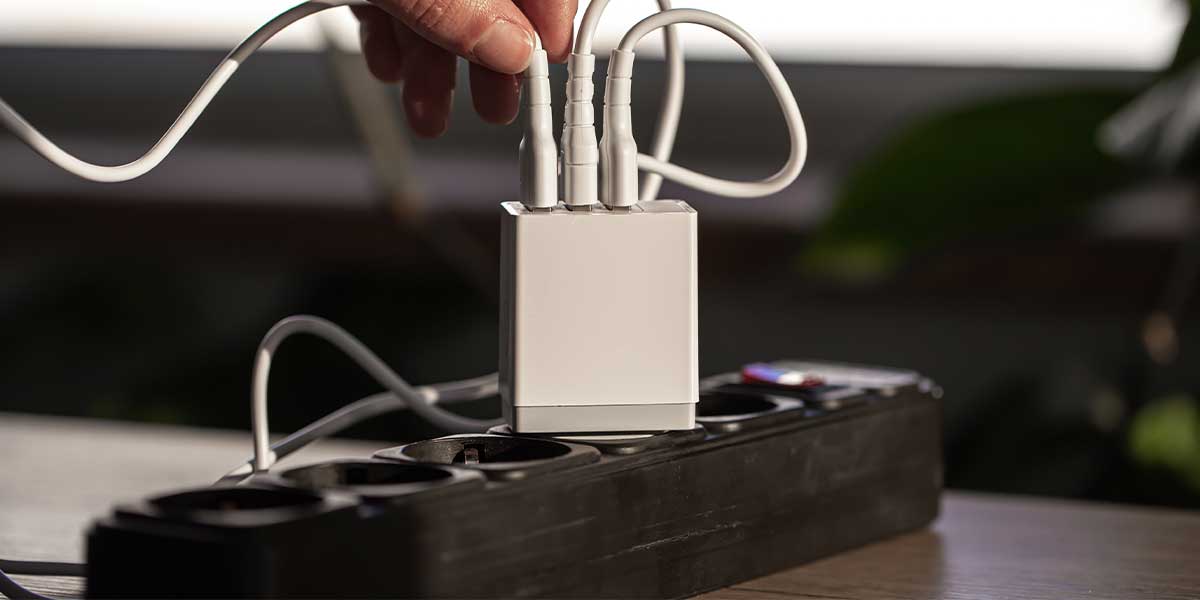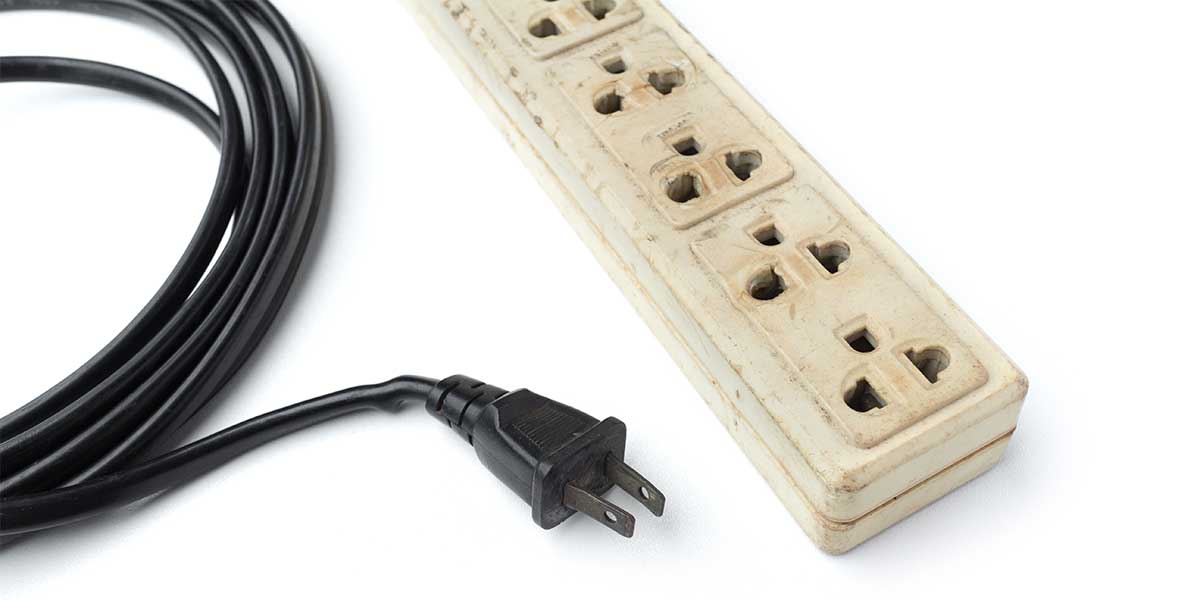Extension cords are a common household and workplace convenience, but they’re also a leading cause of electrical fires across North America. In fact, thousands of fires each year are linked to improper use of extension cords, often resulting in property damage, injuries, and even fatalities. While extension cords may seem harmless, using them incorrectly can create dangerous situations.
At Expert Electric, we’ve seen firsthand the risks of careless extension cord use, and we want to help you stay safe. This guide covers essential extension cord safety tips so you can power your devices without putting your home, family, or business at risk.
Why Extension Cord Safety Matters
Extension cords were designed for temporary use, not as a permanent substitute for proper electrical wiring. Unfortunately, many households use them as long-term fixes, running them under carpets, connecting multiple cords together, or plugging in high-demand appliances. These practices increase the chances of overheating, fire hazards, and electric shocks.
By following simple extension cord safety tips, you can:
-
Prevent costly electrical fires.
-
Protect your family from electric shock.
-
Extend the life of your appliances.
-
Reduce wear and tear on your home’s electrical system.
When in doubt, remember: if you need an extension cord to reach a certain area permanently, it’s time to call a licensed electrician to install additional outlets.
5 Essential Extension Cord Safety Tips for Homeowners
Here are some proven ways to reduce your risks when using extension cords:
1. Keep Extension Cords Away from Water and Heat Sources
Water and electricity don’t mix. Using extension cords near sinks, tubs, outdoor puddles, or damp basements can quickly lead to electrocution or short circuits. Similarly, cords placed near heat sources (heaters, stoves, fireplaces, or radiators) can degrade and cause insulation to melt.
Pro tip:
-
Only use outdoor-rated extension cords in damp or outdoor environments.
-
Plug cords into GFCI (Ground Fault Circuit Interrupter) outlets in bathrooms, kitchens, and garages for added protection.
GFCIs automatically cut power if they detect irregularities, dramatically reducing shock risk.
2. Unplug Properly, Never Yank the Cord
It might be tempting to pull an extension cord from a distance, but yanking can damage the cord, loosen internal wiring, or bend plug prongs. Over time, this weakens both the outlet and the cord itself.
Safe habit: Always grip the plug, not the cord, when disconnecting. This protects your devices, your outlet, and your extension cord.
3. Choose the Right Cord for the Job
Not all extension cords are equal. Every cord has a rating, measured in amps or watts, that indicates how much electricity it can safely handle. Using a cord rated too low for a high-powered appliance, like a space heater or air conditioner, can cause overheating and fire.
Checklist when buying an extension cord:
-
Match the cord rating to the device’s wattage or amperage.
-
Use heavy-duty extension cords for power-hungry appliances.
-
Look for cords certified by safety organizations like UL (Underwriters Laboratories).

4. Always Use Three-Prong Cords (Grounded Cords)
That third prong exists for a reason: grounding. It protects you from shock by safely redirecting electricity in the event of a fault. Never cut or remove the ground pin to fit an older two-prong outlet—doing so eliminates this crucial safety feature.
If your home has only two-prong outlets, it’s a clear sign that your electrical system is outdated. Call Expert Electric to upgrade to safer, grounded outlets.
5. Avoid Daisy-Chaining Extension Cords
Plugging multiple extension cords together, known as daisy-chaining, seems like an easy way to add length, but it’s one of the most dangerous mistakes homeowners make. Daisy-chaining increases resistance, generates heat, and can exceed the cords’ designed capacity. This often leads to fire hazards.
Instead, invest in:
-
A longer single extension cord rated for your device.
-
A power strip with built-in surge protection.
-
Or, the best option: have a licensed electrician install an additional outlet where you need it.
Additional Extension Cord Safety Tips You Shouldn’t Ignore
Beyond the five main rules, here are a few more habits that can keep your home safe:
-
Inspect cords regularly: Replace any cord showing signs of fraying, cracks, or loose prongs.
-
Avoid running cords under rugs or carpets: Heat can’t dissipate properly, and damaged cords may go unnoticed.
-
Don’t staple or nail cords: Punctures can expose wires and increase shock risk.
-
Store properly: When not in use, coil cords loosely and keep them in a dry place.
Real-Life Dangers of Extension Cord Misuse
Many homeowners underestimate the risks of improper extension cord use until disaster strikes. According to the Electrical Safety Foundation International (ESFI), extension cords cause over 3,000 home fires annually in the U.S. Most of these incidents could have been avoided with simple precautions.
Common scenarios include:
-
Running a space heater on a light-duty cord.
-
Using indoor cords outdoors, exposing them to moisture.
-
Daisy-chaining cords across rooms.
-
Covering cords under rugs, leading to unnoticed damage and overheating.
The bottom line: small mistakes can have devastating consequences.
FAQs About Extension Cord Safety
1. Can I use extension cords permanently in my home?
No. Extension cords are designed for temporary use. If you need long-term power in a location, hire an electrician to install a new outlet.
2. How do I know if an extension cord is safe for outdoor use?
Look for labeling such as “For Outdoor Use” or cords with thick, weather-resistant jackets. Outdoor cords are usually orange or brightly colored for visibility.
3. Is it safe to plug a power strip into an extension cord?
No. Power strips are already prone to overloading. Adding an extension cord only increases the risk of overheating and fire.
4. Can extension cords be used with space heaters or air conditioners?
Generally, no. High-demand appliances should be plugged directly into a wall outlet. If an extension cord must be used, it should be heavy-duty and rated for the specific appliance’s wattage.
5. How often should I replace extension cords?
Replace them immediately if you notice fraying, cracking, or loose connections. Otherwise, cords can last several years with proper use and storage.
Final Thought
Extension cords are handy tools, but they’re also one of the most common sources of hidden electrical hazards in homes and businesses. By following these extension cord safety tips, you can keep your property safe and your family protected.
If you find yourself constantly relying on extension cords, it may be time to upgrade your electrical system. At Expert Electric, our licensed electricians can install new outlets, upgrade old wiring, and provide solutions tailored to your needs. Don’t wait until an accident happens, take proactive steps today.
Contact Expert Electric
Need professional help with your home’s electrical safety? Contact Expert Electric today.
-
📞 Call Us: 604-681-8338
-
📧 Email: info@expertelectric.ca
Your safety is our priority. Trust Expert Electric for reliable, professional electrical services in your home.


